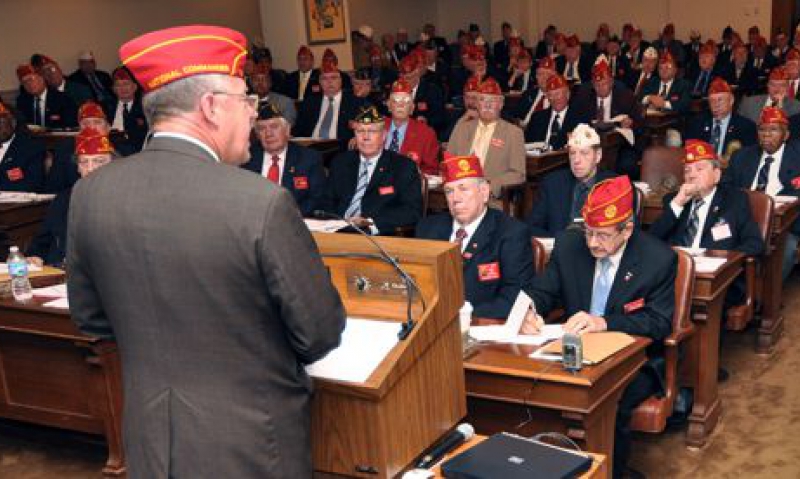
Ad-hoc committee formed during Fall Meetings will investigate current treatments and alternative ways to treat ‘signature wound.’
More than 25 years ago The American Legion sponsored an independent study with Columbia University on the effects of exposure to Agent Orange on Vietnam War veterans. Now, the Legion is again at the forefront of research that will affect the newest generation of veterans for years to come.
During the organization’s Fall Meetings in Indianapolis this week, the National Executive Committee approved the formation of an ad-hoc committee that will investigate existing science and procedures for treating traumatic brain injury and post-traumatic stress, as well as look at alternative methods of treatment that aren’t yet in place in the departments of Defense and Veterans Affairs medical systems.
National Commander Jimmie Foster appointed Past National Commanders William Detweiler, Ron Conley and Robert Spanogle to the committee, along with National Veterans Affairs & Rehabilitation Commission Chairman Michael Helm and Department of Maine National Executive Committeeman Robert Owen to the committee.
The creation of the committee was one of the highlights of a week in Indianapolis that included a quick response from Foster to a ruling by U.S. District Judge Virginia Phillips in Riverside, Calif., that would “immediately suspend and discontinue any investigation, or discharge, separation or other proceeding that may have been commenced” under Don’t Ask; Don’t Tell. Immediately after the news of Phillips’ ruling, Foster drafted a letter to President Obama, asking the president to appeal the ruling.
“For an unelected judge with lifetime tenure to issue such a ruling while the military was in the process of surveying its troops on the impact of such a policy change is outrageous,” Foster told the NEC. “She is basically saying that she knows more than our military leadership, our Congress and our elected commander-in-chief.
“Our military is engaged in two wars. Military commanders have much more important issues to deal with at this time. This is not about politics. It’s about doing what’s best for our troops and not distracting from the war effort. Our military should not be micro-managed by judicial edicts.”
Foster also looked ahead to the upcoming elections and what they will mean to the country’s veterans. “Whichever political party controls Congress is of no interest to us, as long as they do right by America’s veterans and our military,” he said. “We do know that there are always a significant number of new members elected as public officials retire, and it is up to us – those who have been working on veterans issues – to bring the new Congress up to speed.
“You know what’s happening in your states and it’s important for you to be leading advocates for veterans in your legislatures and to your governors. We must be vigilant during election season to make sure that military ballots are not only easily accessible to our troops, but that they are correctly processed and counted. As many as one in four ballots cast by overseas military members went uncounted in the last presidential election. This is a disgrace. No right in American society is more important than the right to vote. Our military men and women are the people most impacted by the decisions made by our elected public officials. No servicemember’s ballot should be discarded because of some bureaucratic technicality. These are, after all, the same men and women who provide us the free society needed to hold democratic elections.”
Foster recently testified in a hearing in front of joint session of the House and Senate Veterans’ Affairs Committees. He said that the time he and other Legionnaires spent in Washington around the hearing proved valuable.
“Thanks to many of the people in this room and other Legion family members visiting their congressional delegations, our voice was heard. It was truly ‘veterans week,’” he said. “On Sept. 20, Congress passed the Gold Star Parents Bill. The next day, several nondefense-related amendments were stricken from the National Defense Authorization Act. An effort to repeal the military’s ‘Don’t Ask, Don’t Tell’ policy failed. Just a week later, a veteran omnibus bill was passed by Congress, which addresses burials, pensions and many other benefits. Congress also passed a continuing resolution funding VA and the federal government at 2010 levels until December.”
But, Foster said, “There is still much work to be done, and we will continue to press the new Congress to ensure that all military retirees that receive disability pay also receive their full retirement pay. Every year we make progress in chipping away at the Disabled Veterans Tax. We will not stop until it is completely eliminated. We will also continue to call on VA to allow veterans to use their Medicare benefits in the health-care system that was built specifically for them.”
- Convention

